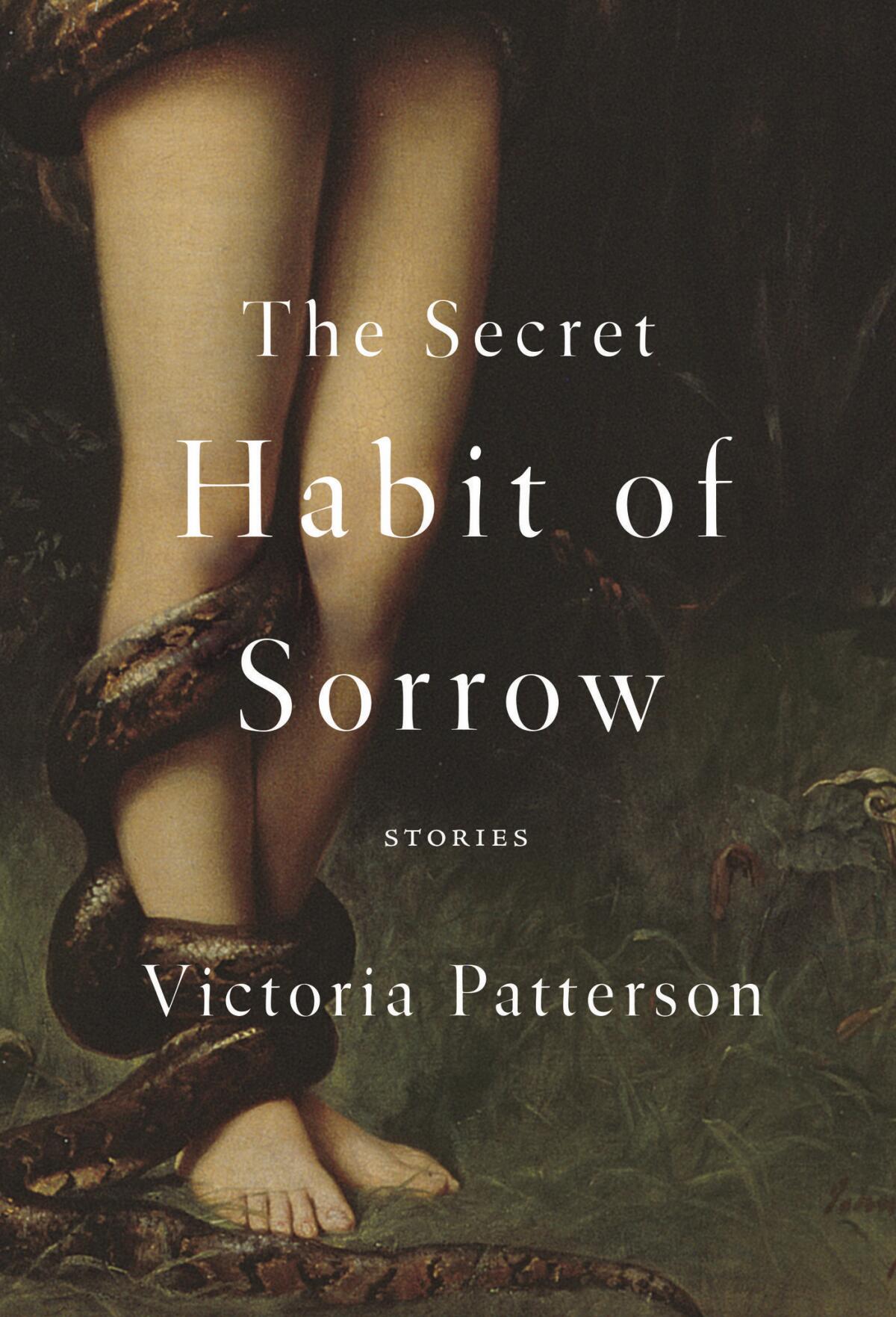In ‘The Secret Habit of Sorrow,’ Victoria Patterson is at the top of her game
- Share via
In “Confetti,” one of the stories in Victoria Patterson’s new collection, “The Secret Habit of Sorrow,” a creative writing professor walks to his Volvo to find his ex-girlfriend, Zaqar, sleeping inside. She’s drunk, not entirely conscious but awake enough to slur, “If I were fictional, people would love me. But I’m real. I’m real! I’m a person, and so everyone hates me.”
She has a point. Authors like Charles Bukowski and Jack Kerouac had a way of making addiction seem almost romantic, the small price a man (and they were always men) had to pay to live his own life, the squares and the consequences be damned. But for people who suffer from substance use disorder, real life isn’t usually like that — drug dependency can lead to unspeakable loneliness, shame and a harrowing sense of unbelonging.
Many of the characters in “The Secret Habit of Sorrow” are in rehab; several others ought to be. The story “Johnny Hitman” opens with the narrator, a woman named Linda, receiving a Christmas card from her childhood best friend, Vivian. Linda lives in a residential facility called New Beginnings; her parents pay for her treatment but otherwise want nothing to do with her.
Vivian, by contrast, is happily married with children; she’s become a born-again Christian, and her cards to Linda are peppered with inspirational quotes. Linda reflects on their shared childhood with a melancholy wistfulness that’s genuinely moving: “We were twelve years old. Sadness had already been building inside me. I could have anticipated my future, but being here — the force of its arrival and the reality — is something entirely different.”
The story speaks to Patterson’s gift for evoking emotion without ever slipping into pathos. She allows us to feel for her characters but never asks us to pity them. It’s a trait she has in common with Denis Johnson, who also wrote about addiction without condescending to his characters (and who Patterson name-checks, to surprising effect, in “Confetti”).

Patterson’s clear-eyed compassion is also on display in “Half-Truth,” which follows a young supermarket cashier named Kelly and her 6-year-old son, Owen. Kelly used to do heroin with Owen’s father, Nick; she kicked the habit but he never did. When Nick reenters Kelly’s life, she’s torn, not knowing whether to err on the side of caution and keep him away from Owen or to allow him to visit the young boy. Patterson renders Kelly’s ambivalence beautifully: “After Owen was born, she was relieved to discover that she loved her son — a straightforward love, different from how she felt about Nick: that other kind of love made her crazy and irrational. It took from her life. What she feels for Owen is bound with guilt and responsibility. It provokes a desire to protect and nourish, deep and real, and it comes from her.”
It’s a perfect description of the dynamics of love, true but unadorned. And Patterson’s accomplished prose is all the more impressive considering her subject matter — she writes about not only addiction but about broken families, unhappy childhoods and sex with a brutal, but never mean-spirited, honesty.
She’s particularly gifted at writing about the mechanics of regret. In “DC,” a woman named Elaine is recuperating from a face lift. The decision was somewhat impulsive, occasioned by a simple dermatological procedure: “The needle sliding into her skin had felt painful and strangely reassuring, and she’d craved a stronger violence, something more extreme like surgery.”
Elaine comes to realize that the surgery was just another impulsive decision gone wrong. She’s living alone in a sad apartment with a nosy neighbor; her husband left her after she admitted to cheating on him. “By the time she’d realized it was merely physical, she’d already dived into the swamp of sex and delusion,” Patterson writes. “She shivered at the horror, understanding again and again and again how she’d traded so much for nothing.”
It’s hard for Elaine to connect with anyone: her semi-estranged college student son, or her loud pothead neighbor. Patterson renders her disengagement perfectly; her characters are mostly lonely, and unsure how to relate to others, fumbling their attempts to communicate effectively.
And this sense of missed connections is what makes “The Secret Habit of Sorrow” such a remarkable collection. Patterson’s stories seldom end neatly; her characters are too real, too stubbornly human to have their problems neatly wrapped up. They’re solitary, even when they’re with others, and they’re adrift even when they seem put together.
That kind of desolation can be difficult to put in writing — it’s not easy to read, and it can’t be easy to write. Patterson conveys the desperation of her characters by using spare prose; every sentence has been whittled down to leave only the necessary words. It’s a technique she shares with Denis Johnson, but also with Mary Gaitskill, who also has an affinity for exploring lost souls that society has essentially chosen to ignore.
“The Secret Habit of Sorrow” is a deeply somber book, but that just serves to make the few moments of triumph all the more affecting — for some of her characters, surviving at all is a kind of victory. There’s not a story in the book that’s less than great; it’s a stunningly beautiful collection by a writer working at the top of her game.
Schaub is a writer in Texas.
::
Victoria Patterson
Counterpoint: 224 pp., $16.95 paper
Sign up for our Book Club newsletter
Get the latest news, events and more from the Los Angeles Times Book Club, and help us get L.A. reading and talking.
You may occasionally receive promotional content from the Los Angeles Times.




